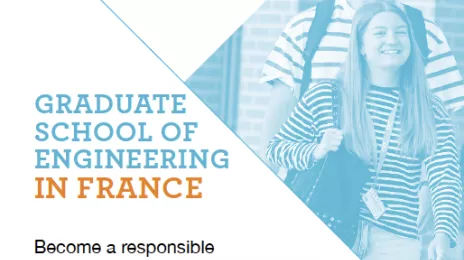The values of the IMT Mines Albi generalist engineer
The IMT Mines Albi engineer is a generalist, responsible engineer who drives change, and whose profile is sought after by companies. Unlike specialized engineers, general engineers are multi-skilled. They have scientific and technical knowledge in all areas of engineering, enabling them to evolve professionally in most sectors and functions. At IMT Mines Albi, you'll have the time to work with your mentor to define the career path that's right for you. The generalist engineering diploma will enable you to work not in one sector in particular, but in a wide range of fields linked to the ecological, digital and factory transitions of the future.
The advantage of IMT Mines Albi's training program is that it offers the same general engineering diploma for students and alternating students.
A comprehensive program to prepare you to become a general engineer
The Generalist Engineering Diploma program is structured in 5 parts:
- Fundamental and scientific courses: to master the processes involved in transforming matter and energy, and the organization and management of production;
- Advanced studies: options and double degrees available;
- Quitus Humanities and Transitions: courses and meetings to better understand transitions;
- Quitus Mobilité internationale: semester(s) of academic exchange or internship in an international company;
- Quitus Entreprise: an internship each year (student program) or an apprenticeship 2/3 of the time in a company (alternating program).
Join the general engineering program at IMT Mines Albi
Depending on your profile and background, there are many different ways to enter our school. You can enter the general engineering program as a student or as a work-study student. You can also take a double degree in pharmacy and engineering.
5 options for a more responsible world
IMT Mines Albi awards the same diploma to general engineers in both the student and sandwich courses. Students can choose from 5 options in line with the ecological, digital and industrial transitions of the future.
Option
Renewable energies, sustainable production and construction
Sharpen your skills in the field of renewable energy systems, from production to distribution, including integration at different scales: buildings, cities, regions and industries.
(Available to students and work-study students)
Option
Pharmaceutical, food and cosmetics processes
To develop an industrial culture and skills in these sectors through the study of manufacturing and business processes, taking into account the specific and evolving constraints of these industries.
(Available to students and work-study students)
Option
Materials and Advanced Processes for Tomorrow’s Transports
To develop high-performance materials solutions and associated processes, in response to the key challenges facing companies and industries of the future: aeronautics, automotive, aerospace, rail...
(Available to students and work-study students)
Option
Industrial Engineering for Organizational Performance
To meet the logistics challenges faced by organizations in all sectors, by optimizing the performance of physical and information flow management systems.
(Available to students and work-study students)
Option
Data Engineering for Information Systems and Energy Systems
To meet the complex challenges linked to the design and management of information systems and the control of energy systems by integrating advanced data analysis and exploitation, as well as Artificial Intelligence, Big Data and smart grids.
(Only available to students)
Engineering profiles sought by companies
The professional integration figures come from the survey carried out by the Conférence des Grandes Écoles (CGE) on the graduating class in 2022.



